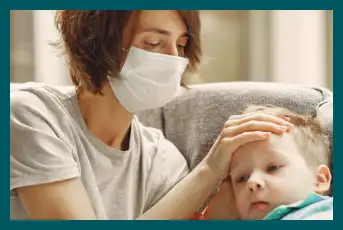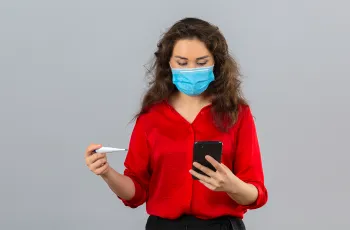Is Glandular Fever Contagious?
Written by Dr Nelson Lau, MBBS FRACGP, GP & Digital Health Specialist. Originally published on 27 May 2024. Blog updated on 09 September, 2025.

Contents

Overview
Glandular fever, also known as infectious mononucleosis, is a common illness in Australia, especially among teenagers and young adults. It's caused by the Epstein-Barr virus (EBV), which spreads easily through saliva. While most people recover well, it can leave you feeling very run-down for weeks. Let us see what a glandular fever is and how a telehealth appointment would help when you need medical advice.What Is Glandular Fever?
Glandular fever is a viral infection that affects the immune system. It often starts with a sore throat, fatigue, and swollen glands in the neck. The illness is sometimes called "kissing disease" because it spreads mainly through saliva.Symptoms of Glandular Fever
- Sore throat (often severe)
- Extreme tiredness and weakness
- Swollen lymph nodes in the neck or armpits
- Fever and night sweats
- Loss of appetite
- Headaches or body aches
- Swollen spleen (in some cases)
Who Does Glandular Fever Affect?
Glandular fever mostly affects teenagers and young adults in Australia, typically between the ages of 15–25. Children may catch it too, but their symptoms are usually mild and may be mistaken for a simple cold.How Contagious Is Glandular Fever?
The virus is highly contagious, especially in the first few weeks of infection. It spreads through saliva but can also pass via close contact. Ways it spreads:- Sharing drinks, food, or cutlery
- Kissing or close contact
- Coughing or sneezing near others
How Long Are You Contagious?
- First few weeks of illness: Most contagious
- Up to 2 months: Virus may still be in saliva
- In some people, EBV can remain in saliva for 6 months or more, but the risk of spread is much lower
Does glandular fever require isolation?
Typically, isolation isn't necessary for someone with glandular fever, mainly because it requires such close contact for transmission. Most people continue their daily routines, but should focus on getting plenty of rest, staying hydrated, and avoiding strenuous activities to protect their swollen spleen and aid in recovery. It's more about slowing down and taking care of yourself than completely withdrawing from your social life.Feeling unwell? Consult an Australian-registered GP online, 24/7.
Consult now
Available 24/7, across Australia.
Prevention & Reducing Spread
- Avoid sharing food, drinks, or utensils
- Don't kiss or have close contact while sick
- Wash your hands regularly with soap and water
- Rest and support your immune system to recover faster
- Cover coughs and sneezes with a tissue or elbow
Glandular fever treatment
Dealing with glandular fever isn't a quick fix; think more of a marathon than a sprint. Since it's a viral infection, antibiotics won't be effective unless there's a secondary bacterial issue. Instead, you'll need to rely on conservative measures: rest, hydration (water or herbal tea are your best bets), and some over-the-counter medications like paracetamol or ibuprofen to handle the fever and sore throat. Doctors will also likely suggest skipping contact sports or heavy lifting for a while because an enlarged spleen is more prone to rupture. No magic bullet will cure it, but a warm saltwater gargle or soothing lozenge can help ease the throat pain. Every little bit counts. Despite the somewhat daunting nickname and the severe symptoms it can manifest, glandular fever is generally manageable with careful personal health management and a bit of social discretion. Remember, while it's fine to socialise with someone who has glandular fever, maintaining personal hygiene and being mindful of your interactions, like sharing food or drinks, is crucial. If you suspect you have glandular fever, a trip to your healthcare provider is prudent—they can help confirm the diagnosis and guide you through recovery.Complications to Watch For
Most people recover well, but some may develop complications like:- Enlarged spleen (risk of rupture if injured)
- Ongoing fatigue lasting weeks or months
- Rarely, liver inflammation (hepatitis) or jaundice
What is the difference between tonsillitis and glandular fever?
Glandular fever and tonsillitis might sound very similar to swollen glands and a sore throat. But tonsillitis usually stays local, mainly affecting the tonsils because of viruses or bacteria like streptococcus. It makes swallowing feel like trying to eat sandpaper and can also be associated with a fever. If bacteria are the culprit, antibiotics are your golden ticket; but if it's a viral case, you'll simply need rest and conservative treatment to get back on your feet. Glandular fever, however, is a different story as it plays a long game. It's a systemic illness that doesn't just stop at your throat. When the Epstein-Barr virus (EBV) takes hold, your lymph nodes and spleen swell up, and fatigue lingers for weeks or even months. Unlike tonsillitis, where you might feel better after a few days of medications and conservative treatments, glandular fever can leave you exhausted for a long time. The key is managing those symptoms as best as possible because there's no easy way to fight off the virus itself.When to Consult a Doctor in Australia
Consult a GP if you have a severe sore throat, fever that doesn't ease, or extreme fatigue. You should also seek urgent care if you experience sudden abdominal pain (which could signal spleen issues) or difficulty breathing/swallowing.How Hola Health Support
Hola Health offers online telehealth consultations with Aussie doctors who can assess your symptoms, order blood tests if needed, and provide recovery advice. This saves you a trip to the clinic when you're feeling unwell.FAQs
Can you go to work or school with glandular fever in Australia?
It's best to stay home in the early weeks, as you're most contagious and likely too tired. Return when your GP says it's safe and you feel stronger.How long should you rest after glandular fever?
Most people need at least 2–4 weeks of rest. Full energy levels may take a few months to return.Can you get glandular fever more than once?
Usually, once infected, your body builds immunity. Rare cases of reactivation can occur, but they are uncommon.How do I know if my sore throat is glandular fever or just a cold?
A cold usually improves in a week. If your sore throat is severe, with swollen glands and extreme fatigue, it's worth checking with your GP.Is glandular fever the same as mono?
Yes – "mono" is the US name for glandular fever. In Australia, we commonly use "glandular fever."How long is glandular fever contagious after symptoms?
You're most contagious for the first few weeks. However, the virus may remain in your saliva for months.What foods or drinks help recovery from glandular fever?
Stay hydrated with water and warm teas. Soft, soothing foods like soups, smoothies, and yoghurt can help if your throat is sore.Is glandular fever contagious through the air?
The good news here is that glandular fever is not airborne. You cannot catch it just by breathing the same air as someone infected. Transmission requires much closer contact, specifically involving saliva. This means you can still attend classes, go to work, or sit in a cafe without fear of catching the virus from the air.Feeling unwell? Consult an Australian-registered GP online, 24/7.
Consult now
Available 24/7, across Australia.
Providing consult for
- Cough
- Nausea & vomiting
- Fever
- Hayfever
- Fatigue
- Sore throat
- Acne
- Gout
- Eczema
- Rosacea
- Sunburn
- UTI
- Erectile dysfunction
- Contraception
- Morning sickness
- Morning after pill
- Prostate health
- Anxiety
- Depression
- Stress
- Grief & loss
- Premature ejaculation
- Asthma
- Blood pressure
- Diabetes
- Cholesterol
- Migraines & headaches
- Allergies
- Heartburn & reflux
- Sleep disorder
- Gastro
Related Articles
Disclaimer
This blog is for general informational purposes only and does not indicate that Hola Health provides all treatments or preventive measures mentioned. It is not intended to be a substitute for professional medical advice. Always seek the guidance of your doctor or other qualified health professional with any questions you may have regarding your health or a medical condition. For emergencies please immediately contact 000. Any medical topics discussed are intended to educate, not to imply availability through Hola Health.




